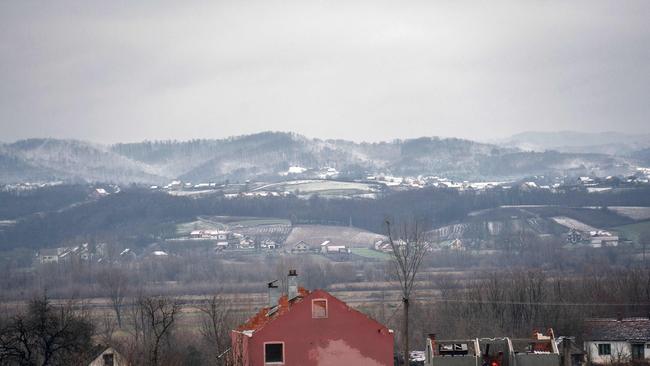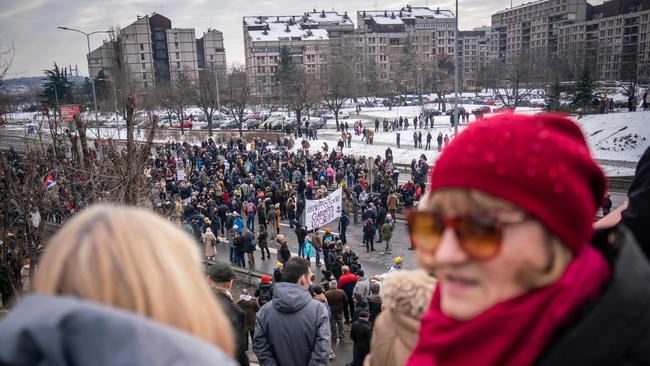Serbian government backs out of controversial Rio Tinto lithium mine; Rio considering ‘legal basis’
Rio Tinto is ‘considering the legal basis’ for a decision by Serbian authorities to cancel its project after weeks of public protests.

Rio Tinto says it is reviewing its legal options after the Serbian government flagged the cancellation of the its Jadar project in the country, a decision that could leave the mining company’s lithium strategy in tatters.
Rio Tinto had not received any formal notification of the cancellation of exploration and other licenses at Jadar, but the company appears to have fallen badly afoul of local politics on Thursday night when under-pressure Serbian Prime Minister Ana Brnabic said she planned to “put an end to Rio Tinto in the Republic of Serbia” in a televised address.
Rio has already spent about $US450m ($625m) on work developing the massive lithium deposit, which was to be the flagship of its growth strategy into the battery minerals sector.
The reversal from Serbian authorities comes months ahead of national elections and as the administration of President Aleksandar Vucic’s looks to shore up voter support amid a wave of protests over the Rio project that had already forced the mining major to push back the likely development timetable for Jadar.
It also comes as relations between Belgrade and Canberra deteriorated markedly over the deportation of Serbian tennis star Novak Djokovic from Australia over his vaccination status.
There is no evidence of a direct link between the cancellation of Jadar and the political row over Djokovic’s deportation, but supporters of the Serbian tennis player have repeatedly circulated conspiracy theories linking Rio to the deportation decision based on Djokovic’s reported support for anti-Jadar protests.
The conspiracy theories suggest – without any basis – that Rio applied pressure to Prime Minister Scott Morrison through his chief of staff John Kunkel, who worked in the Anglo-Australian miner’s government relations team for two years until 2018.
Internally, Rio is attributing the Serbian government’s about-face to local electoral politics rather than the fallout from the federal government’s visa debacle over Djokovic – but, with Australia badly on the nose in the Balkan nation, the diplomatic row could hardly have helped.
A spokesman for Rio said on Friday the company was “extremely concerned” by Ms Brnabic’s comments, adding it the company was reviewing its options over the project’s future. “Throughout our work on the Jadar Project we have always operated in compliance with the laws of the Republic of Serbia. Rio Tinto is reviewing the legal basis of this decision and the implications for our activities and our people in Serbia,” he said.
In her address, Ms Brnabic told Serbian voters the government had “fulfilled all the demands from the environmental protests and have put an end to Rio Tinto in the Republic of Serbia.” Serbia’s ruling coalition, led by the Serbian Progressive Party (SNS), currently has a comfortable parliamentary majority.
But its plans to reinvigorate the country’s economy through the support of lithium and copper mining have fallen afoul of voters that are still mindful of the environmental damage caused by decades of mining when the country was still a client-state of the Soviet bloc.
For weeks, thousands of protesters have taken to the streets across Serbia to protest against the government’s handling of the lithium project.
In addition to Rio, protesters have also targeted a copper mine owned by China’s Zijin Mining – a Soviet era mine recently reopened by the Chinese company.
While Rio has promised to minimise the environmental impacts of Jadar, protests have focused on the need to move several small villages that sit within the mine’s boundaries as well as potential environmental damage caused by mining.
Although a formal date for the next election is yet to be announced, Serbia is expected to head to the polls in early April.
The cancellation of Jadar would put a substantial hole in Rio’s plans to shift into the battery metals sector.
Jadar was discovered in 2003, and Rio has spent considerable time and resources working out ways to unlock the complex deposit in the hope of turning it into Europe’s biggest lithium mine, with the company hoping to use Jadar to tap into the electric battery market forming around European car makers.
Last year, despite ongoing opposition to the mine, Rio’s board ticked off on the $US2.4bn development of the deposit, with chief executive Jakob Stausholm pointing to Jadar as a key part of Rio’s future growth.
It said at the time it had spent about $US450m on feasibility studies at the project, with much of the work having been conducted in its Bundoora Bundoora technical development centre in Melbourne’s western suburbs.
Rio has since agreed to acquire the Rincon lithium project in Argentina for $US825m, but the loss of Jadar would still put a serious dent in its plans to expand into the battery minerals sector.
Last week, in its December quarterly production report, Rio pushed back the likely time frame of Jadar by a year, blaming approval delays for pushing out first saleable lithium production to until 2027 “at the earliest”.
Rio shares closed down $4.69, or 4.1 per cent, to $108.72 on Friday. They have fallen almost 9 per cent in the last 12 months.
With AFP
#Djokovic speaks in favour of protests in Serbia and against Rio Tinto mining.
— SaÅ¡a Ozmo (@ozmo_sasa) December 4, 2021
“Clean air, water and food are keys to one’s health. Without it, talking about ‘health’ makes no senseâ€.
ðŸ‘ðŸ‘👠pic.twitter.com/UwWO8KHdKo





To join the conversation, please log in. Don't have an account? Register
Join the conversation, you are commenting as Logout